With its rapid-fire jokes, running gags, and layered callbacks, Arrested Development became a gold standard for meta TV long before it was cool to be self-aware. Whether it was Michael Bluth trying to wrangle his wildly dysfunctional family, G.O.B. pulling off (and botching) magic tricks, or Tobias proving once again that he “blue himself,” Arrested Development mastered the art of absurdist satire while still managing to hit emotional beats when you least expected it.
Videos by ComicBook.com
With Netflix revivals, Emmy wins, and more iconic one-liners than you can fit in a stair car, narrowing down the show’s best episodes isn’t easy, but we gave it the old Bluth college try. For us, these episodes represent the most brilliant, bizarre, and banana-stuffed moments in Arrested Development history.
1) “Development Arrested” (Season 3, Episode 13)

Created as the series’ original finale before the Netflix revival, “Development Arrested” encapsulates everything Arrested Development did best. The episode centers around Michael Bluth’s realization that the family he’s tried so hard to hold together has been manipulating him the entire time, including the discovery that George Sr. has been using him as a corporate patsy.
Narratively, the episode is packed with layered callbacks. We see the return of the banana stand; Lucille’s ongoing manipulation from behind the scenes; and a full-circle moment when Michael walks away from the family, only to find that he still can’t bring himself to quit them.
The final act’s metafictional flourish, where Ron Howard appears on screen to suggest the Bluths’ story might make a good movie, is one of the most well-known examples of the show’s fourth-wall-breaking humor. It was a bold move that paid off, anchoring the show’s self-awareness without descending into parody.
2) “S.O.B.s” (Season 3, Episode 9)
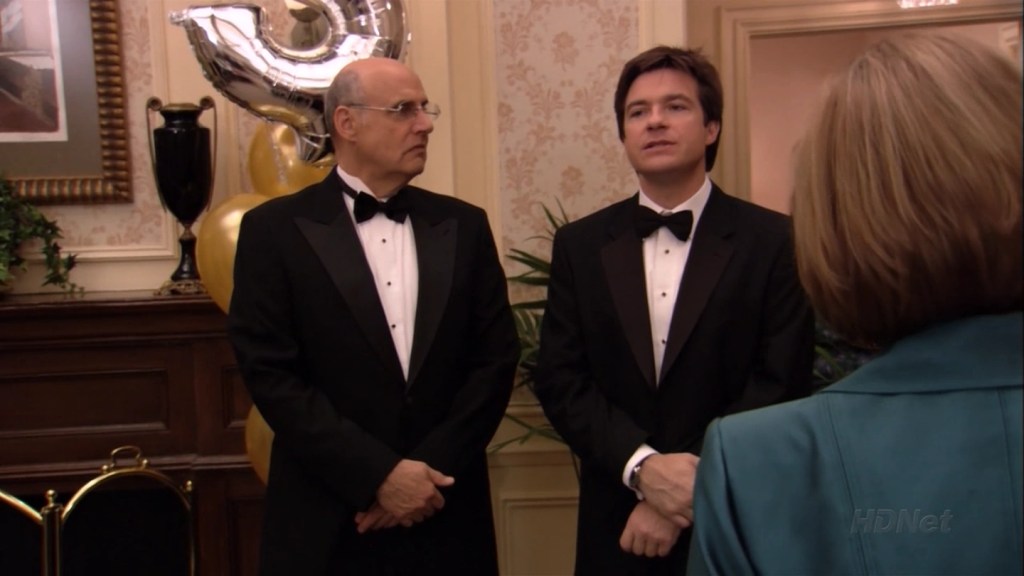
Obviously short for “Save Our Bluths,” and nothing else, this episode shows the Bluth family holding a fake fundraiser to gain public sympathy, but it’s also direct, thinly veiled appeal from the show’s creators asking Fox to save the series from cancellation. Creator Mitchell Hurwitz used this episode as an opportunity to satirize the very mechanisms of network television. It’s an indictment of the idea that quality content can be saved by spectacle, perfectly encapsulated when Michael sarcastically refers to it as “a very special episode.”
Every scene is laced with meta-commentary. Lucille’s decision to add live segments and celebrity cameos (including Richard Belzer and Andy Richter) mirrors the kind of last-minute gimmicks networks often suggest to boost ratings. By turning its own potential demise into comedic material, “S.O.B.s” serves as a brilliant example of how Arrested Development was always ahead of its time in the meta stakes.
3) “Pier Pressure” (Season 1, Episode 10)
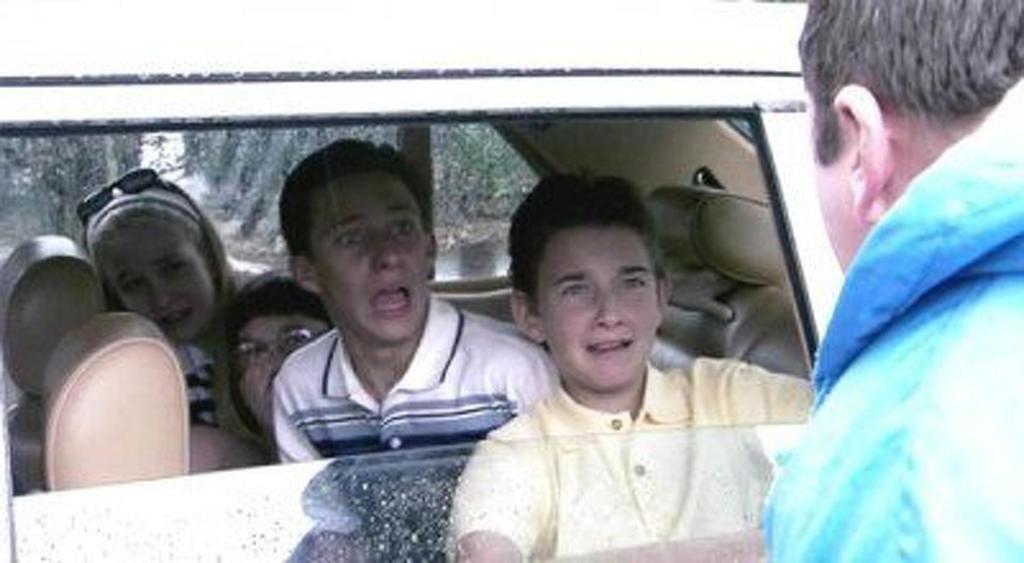
“Pier Pressure” is often hailed as a masterclass in comedic escalation, and even creator Mitchell Hurwitz has named it as one of his favorites. What begins as a simple story — Michael trying to teach his son a moral lesson — quickly spirals into one of the show’s most ludicrous setups. The plot involves a fake drug deal, a staged car accident, and a one-armed man named J. Walter Weatherman.
The episode’s comedy hinges on repetition and absurd payoff. George Sr.’s use of Weatherman in elaborate cautionary tales, complete with gruesome fake injuries, becomes one of the show’s longest-running and most beloved jokes. These lessons, while ostensibly meant to teach responsibility, highlight how twisted the Bluth family’s moral compass truly is.
Michael’s good intentions are consistently undermined by his inability to trust (thanks Mom and Dad). He doesn’t realize that George Michael is telling the truth, and his attempt to parent like his father ends in farce.
4) “Top Banana” (Season 1, Episode 2)
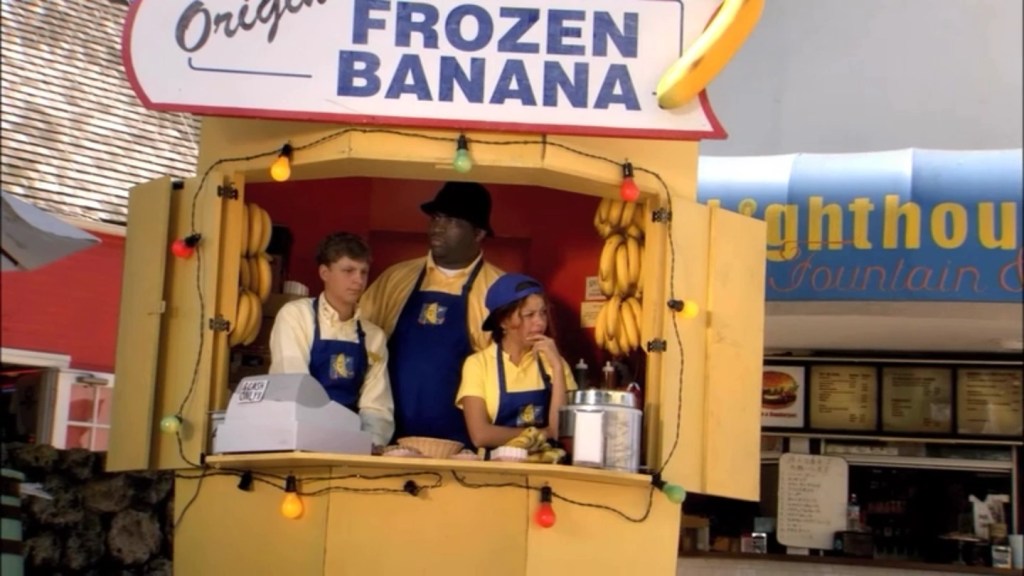
As the show’s second episode, “Top Banana” played a crucial role in establishing Arrested Development‘s tone for the show’s future. It is the birthplace of “There’s always money in the banana stand,” the series’ most enduring catchphrase.
The plot follows Michael as he tries to teach George Michael about responsibility by entrusting him with running the family’s frozen banana stand. Predictably, things unravel. George Michael attempts to impress his crush Ann by giving away free bananas, while G.O.B. accidentally burns down the stand, unaware that thousands of dollars were hidden in its walls. This literal destruction of the family’s financial fallback is played with gleeful irony, especially as Michael had just warned, “The money is in the banana stand.” It’s also the first time we see Tobias’s ill-fated attempts to join the Blue Man Group, a subplot that becomes increasingly ridiculous across seasons.
5) “Good Grief” (Season 2, Episode 4)

Few episodes capture the show’s ability to blend melancholy and absurdity quite like “Good Grief.” Centered around the (false) belief that George Sr. has died, the episode shows the Bluth family navigating grief in the most dysfunctional ways imaginable. As usual, Michale takes on the responsible role while the rest of the family are distracted. Lucille throws a party, Lindsay is preoccupied with appearances, and Buster mourns a missing dog rather than his father.
George Michael, meanwhile, processes the loss with more emotional maturity than most of the adults, though he’s also confused by the increasingly bizarre behavior around him. Tobias’s role as Mrs. Featherbottom — a drag persona inspired by Mrs. Doubtfire — simply adds to the bizarreness, especially when he attempts a trampoline entrance and crashes through a glass table. It’s beautifully executed slapstick comedy at its most exaggerated.
6) “Making a Stand” (Season 3, Episode 8)
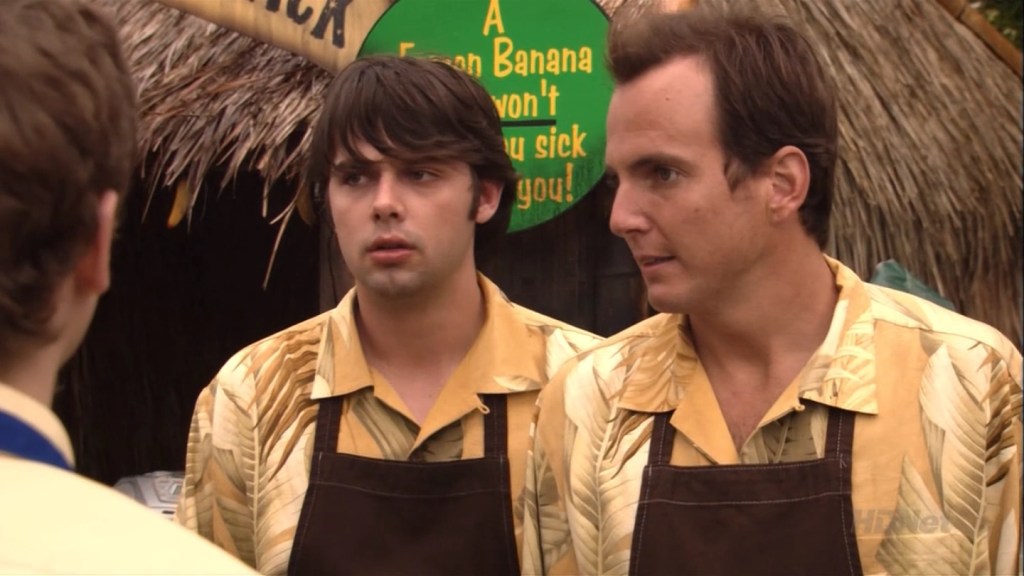
Sibling rivalry takes center stage in “Making a Stand,” where Michael and G.O.B. compete over the operation of rival banana stands. What begins as a petty business feud quickly evolves into a larger scheme. Michael uses the banana stand conflict as a cover for a sting operation designed to expose their father’s criminal manipulations.
The episode’s elaborate plan involves G.O.B. pretending to be captured and interrogated in a faux warehouse, with Michael pulling the strings behind the scenes. As with many of the show’s best episodes, the layers of deception are as entertaining as they are convoluted. Jason Bateman’s understated reactions contrast perfectly with Will Arnett’s physical comedy and over-the-top
7) “In God We Trust” (Season 1, Episode 7)
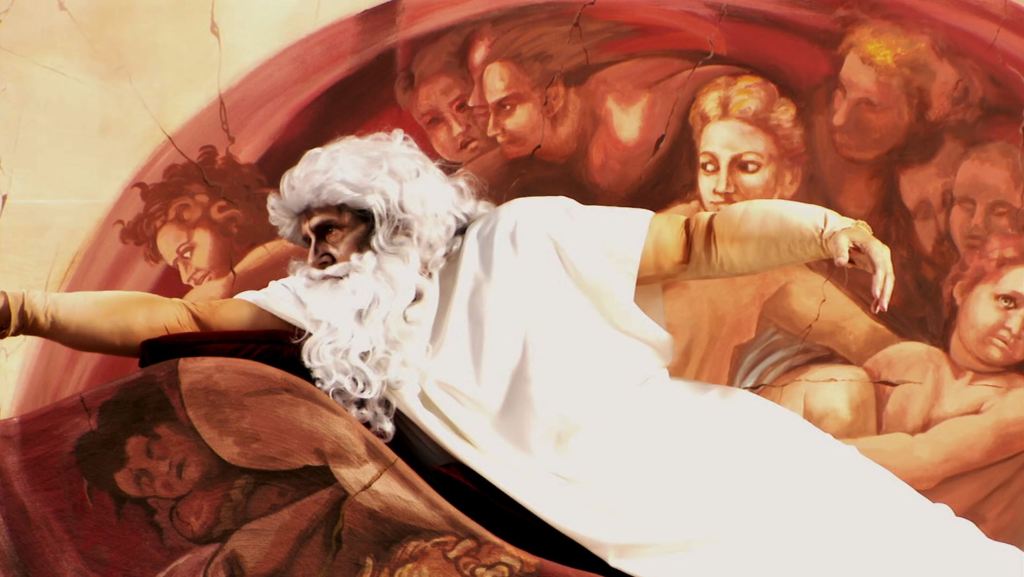
“In God We Trust” is an early standout that crystallizes several major character dynamics. George Sr., fulfilling court-ordered community service, performs in the Living Classics Pageant as Michelangelo’s “God” from the Sistine Chapel, while Michael and G.O.B.’s competition for Marta begins in earnest. This establishes a love triangle that runs through much of Season 1. Their rivalry brings out both their best and worst qualities, offering a window into how even their most sincere gestures are pretty much always driven by insecurity and narcissism.
The episode also introduces Tobias’s “never nude” condition. His fear of being seen wearing anything less than jean cutoffs — even in the shower — becomes a defining trait for him across the series. The reveal is done casually, yet it becomes one of the most iconic running jokes in TV comedy.
8) “Meat the Veals” (Season 2, Episode 16)
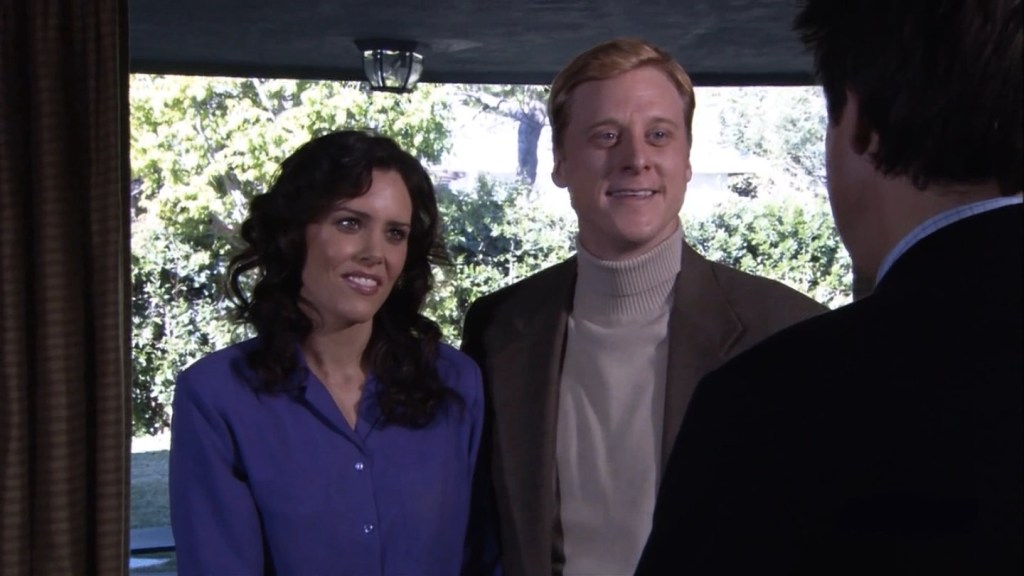
“Meat the Veals” revolves around Michael using his own family in an underhanded attempt to turn the ultra-religious Veal family against the Bluths in order to stop his son’s pre-engagement. Alan Tudyk and Ione Skye guest star as the Veals, Ann’s conservative parents, providing a hilarious contrast to the Bluths’ chaos. Things get especially problematic when Ann’s mother makes out with Michael on the Bluth balcony.
Tobias once again appears as Mrs. Featherbottom, completely oblivious that the entire family knows it’s him. Meanwhile, Buster attempts to flee his overbearing mother by literally running away from home, only to realize he has nowhere else to go. G.O.B. tries to help George Sr. escape from the attic by smuggling him out in a body bag, which predictably leads to confusion and near disaster.
Though not as often discussed as an iconic series episode, it remains a fan favorite for its dense gags, physical comedy, and character payoffs. The episode exemplifies the show’s talent for satirizing traditional sitcom tropes while weaving them into a far more complex and chaotic tapestry.
9) “Colony Collapse” (Season 4, Episode 7)
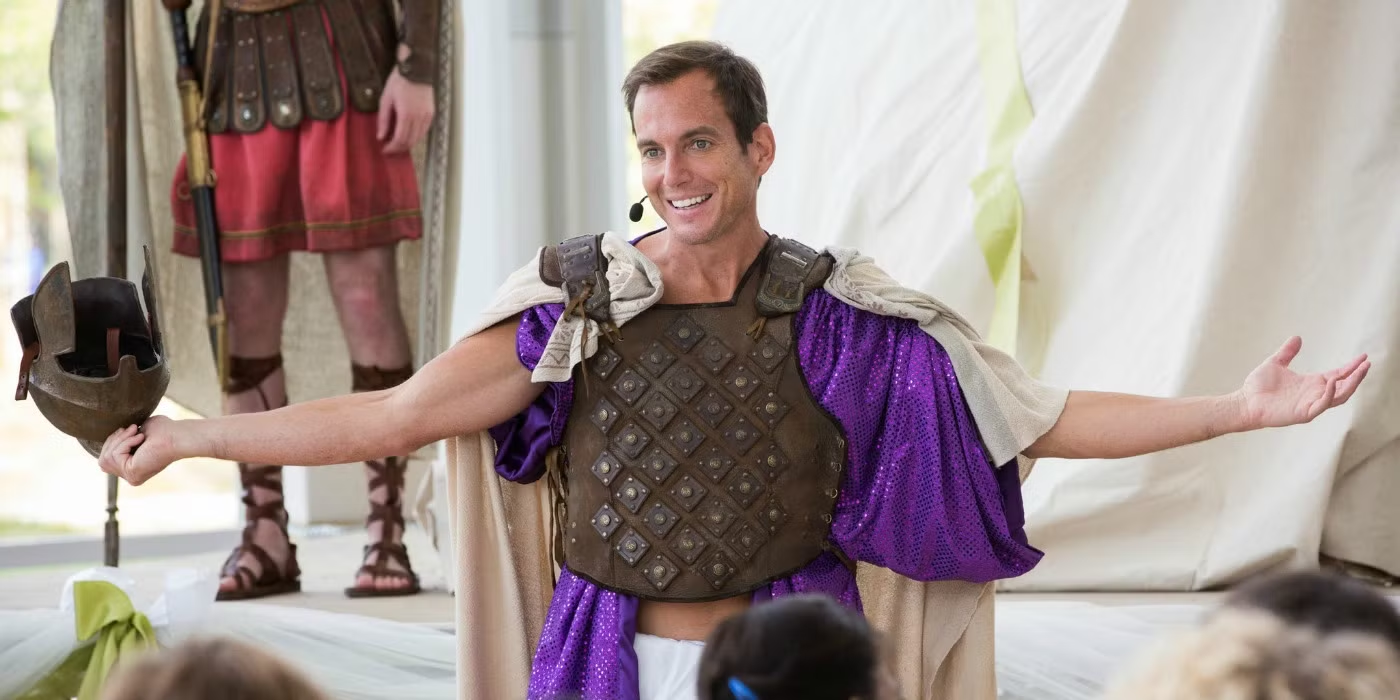
Widely see as one of the few highlights in the Netflix revival, “Colony Collapse” centers on G.O.B. and his downward spiral following the dissolution of his relationship with Lucille 2, his increasingly tenuous place within the Bluth family, and his unraveling self-image as a confident lothario and successful magician.
Critics praised this episode for managing to capture what much of Season 4 struggled with—balancing the show’s signature absurdity with grounded character exploration. Arnett received widespread global acclaim for his performance, with many critics highlighting his ability to navigate slapstick and pathos with equal skill. In a season often criticized for sacrificing character development for structural gimmickry, “Colony Collapse” stands out as one of the rare instances where both elements harmonize.
10) “Exit Strategy” (Season 3, Episode 12)

As the penultimate episode of the original Fox run, “Exit Strategy” is a high-stakes, globe-trotting installment that ties together a multitude of absurd plotlines while keeping the show’s characters front and center. It sees Michael and Buster traveling to Iraq to rescue G.O.B., who has been mistakenly taken hostage after a USO performance gone awry.
Jason Bateman and Tony Hale are in top form in this episode. With Michael’s increasing exasperation clashing hilariously against Buster’s enthusiasm for returning to a war zone, having briefly mistaken it for an opportunity to prove himself after losing his hand. “Exit Strategy” is notable not just for its farcical international setting, but for the way it balances the show’s serialized storytelling with immediate laughs.








